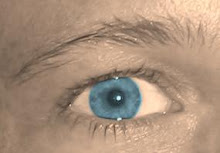 Yesterday I was reading about a tasty dessert including bilberry. I like berries and I have never heard of bilberry before so I started to google for it. At the top of the search there was a link to my favourite source of knowledge Wikipedia.
Yesterday I was reading about a tasty dessert including bilberry. I like berries and I have never heard of bilberry before so I started to google for it. At the top of the search there was a link to my favourite source of knowledge Wikipedia.I was quite surprised to see that bilberry is the same as what we in Sweden call blueberry. But we call it the Swedish name blåbär, which directly translated and literally becomes blueberry. This has lead most of us to use the word blueberry when we talk about our blåbär in english. This seem to be very wrong of us.
I asked several of my colleges what they call blåbär in english and all of them said blueberry and none of them knew what bilberry is. This topic covered most of our lunch time. :)
The truth seem to be that we don't have any blueberries in Sweden or any wild blueberries anywhere in Europe. They only exist in North America. What a surprise!
There are some similarities and some differences between the berries.
 Bilberry have a dark blue skin and dark red or purple meat with a very juicy sweet taste. They break easily and stains your fingers and the stains are very hard to wash of. The berries are grouped one by one on the plant. They are very hard to cultivate and therefore you only find them in the wild were they usually grow up to 10-40 cm low bushes.
Bilberry have a dark blue skin and dark red or purple meat with a very juicy sweet taste. They break easily and stains your fingers and the stains are very hard to wash of. The berries are grouped one by one on the plant. They are very hard to cultivate and therefore you only find them in the wild were they usually grow up to 10-40 cm low bushes. Blueberry have a blue skin and white or light green meat. The meat is firmer and not as sweet as bilberry. The firm meat makes them not as easy to break and are easier to transport. The berries are a little bigger than bilberries and have a "crown at the end". The plants are higher than the low bilberry plants and the cultivated ones are up to 4 meters tall. The berries are grouped together in clusters of several berries.
Blueberry have a blue skin and white or light green meat. The meat is firmer and not as sweet as bilberry. The firm meat makes them not as easy to break and are easier to transport. The berries are a little bigger than bilberries and have a "crown at the end". The plants are higher than the low bilberry plants and the cultivated ones are up to 4 meters tall. The berries are grouped together in clusters of several berries.Maybe we should use the name bilberry or maybe "European blueberry" if we want English speaking people to understand what we mean.




No comments:
Post a Comment